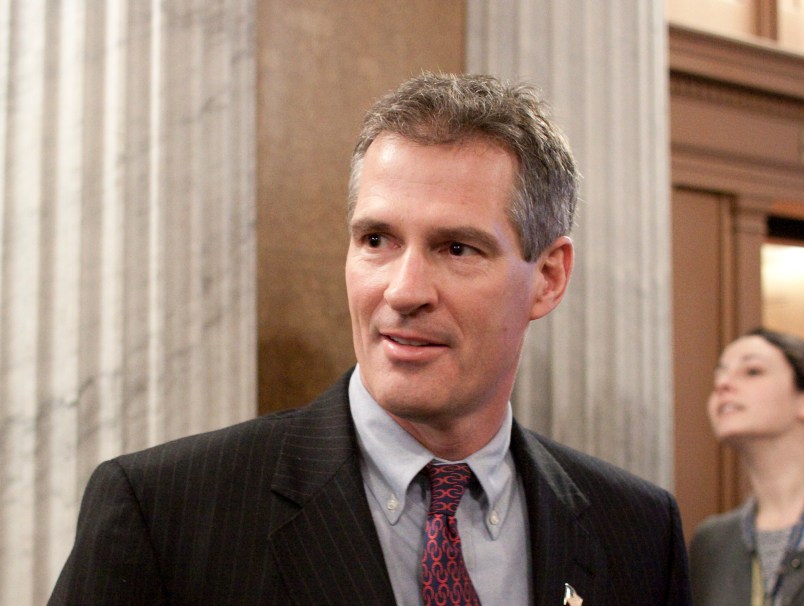Former Sen. Scott Brown (R-MA) thinks he can do something we haven’t seen in our lifetimes: represent two different states in the United States Senate.
On Thursday news broke that the former Massachusetts is forming a Senate exploratory committee, a step below him formally announcing his candidacy to replace Sen. Jeanne Shaheen (D-NH) in the chamber.
Unfortunately for Brown, history doesn’t seem to be on his side. According to the U.S. Senate Historical Office, only two senators have represented multiple states in the history of the chamber: Sen. James Shields (D) served as senator from Illinois, Minnesota and Missouri in the 19th century and Waitman Thomas Willey who represented Virginia and West Virginia roughly around the same time. Willey was a member of the Republican and Unionist parties. Shields was last elected in 1879 and Willey’s last term ended in 1871.
“Quite often they were elected in the House in one body and to the Senate in the other or that sort of thing,” Senate historian Don Ritchie told TPM on Friday. “But why did so many move around? Well the nation was on the move. In the 19th Century pioneers were moving west steadily and if you look at a lot of senators from the west they were born in Vermont or Ohio or whatever.”
Shields seems to be the closest historical analogy to Brown’s modern-day scheme, since he lost re-election in Illinois and then moved to the Minnesota territory then ran once it became a state. After fighting in the Civil War, Shields later settled in Missouri, where he ran for Senate. Willey was one of West Virginia’s delegates to the state’s constitutional convention, then ran for Senate when it became a state.
Beyond that, there have been 28 lawmakers who have represented one state as delegate or representative and another state in the Senate, according to the Senate Historical Office. Today, the state-to-state moves usually happen before a candidate starts his or her political career.
“It’s different from being born somewhere else and moving to a state. Like [President Barack Obama] was born in Hawaii and educated in New York and Massachusetts and winds up in Illinois,” Ritchie said. “Once he gets there he’s like lots of other people who move to Illinois, he’s sort of establishing himself. But after he’s elected in Illinois he doesn’t move over and run in Wisconsin, let’s say” Ritchie said. “I think voters look on that in a different way.”
A prime example of a modern example of running for Senate in multiple states is Brown’s contender in GOP primary: former Sen. Bob Smith (R-NH). Smith tried to run for Senate in Florida in 2010 but lost. Now he’s back in New Hampshire hoping to get his old job again. Of course there have been plenty of past attempts, most recently Liz Cheney’s failed attempt to beat Sen. Mike Enzi (R-WY) in Wyoming by moving there from Virginia.
Brown may have a better shot than Smith, but so far things aren’t looking good. A recent Suffolk University poll found Shaheen leading Brown 52 percent to 39 percent. And a small state like New Hampshire might not necessarily be friendly to outsiders coming in and running for office, said Dartmouth College political science professor Linda Fowler.
“A large state like New York is used to people moving to the state and becoming a senator,” Fowler said. “Daniel Patrick Moynihan, it’s not just Hillary, it was Robert Kennedy. There have been a bunch of them. And because it’s been such a cosmopolitan state and they have national news media that hasn’t been a problem. I think in smaller states where there’s more of a friends-and-neighbors effect it is more difficult.”
Fowler acknowledged that New Hampshire could be a special case because the Boston media market stretches up there. Brown, Fowler noted, has high name recognition in the state and has spent a fair amount of time there.
“So the usual obstacles are name recognition, political networks, and being regarded as an outsider who who doesn’t understand what the issues are facing the state,” Fowler added. “I actually think that Brown might be vulnerable on the last one. After all, Massachusetts is a very liberal state.”
“On the other hand he really did fight hard against Elizabeth Warren in a liberal state in a presidential year and he did pretty well,” Fowler continued. “So he’s been in the fire, if you will, tempered by the fire of a serious campaign and came off pretty well. I just don’t know if he wants it that much.”






